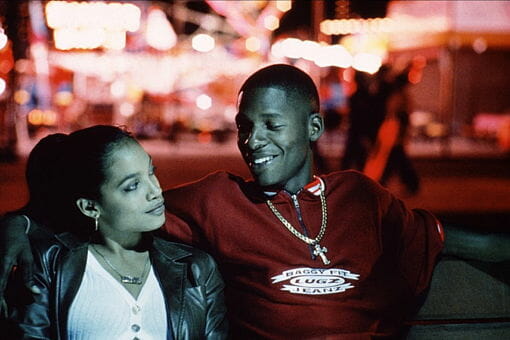Sign up for the
TSL Newsletter
and get $50 off Final Draft 12
By Patrick Kirkland · October 17, 2011

There are 12 index cards on the black pegboard in front of me.
Card #1: An explosive opening. There is no way I can write an opening more perfect.
Card #2: The introduction of my Hero- in one scene, I've made him likable, relatable, and simply an overall badass.
Card #40: A climax of fantastic proportions. Brave. Jaw-dropping. Exactly the climax I want to tell.
Card #50: A dynamite ending. Emotional. Inspirational. Faulkner would be jealous.
Card #12: Empty. Empty. Empty. Empty. Empty.
Here I am, in the middle of the story, and all around me I have index cards that all tell some semblance of a what I want to write, but no idea how to piece it together. A story that I want to tell, and a character that I absolutely love… and the two just don't go together.
One of the thousand how-to-write-a-screenplay books I've read will tell me to follow the beat sheet. Card #5 should give me a turn. Card #10 will complete Act 1. And somehow on page twenty-something, I should write a change of immeasurable proportions.
Another will tell me to follow the character. Let the character take control of the story, and let them make the choices. All I supposedly have to do is write them down. The problem is that my character is doing the equivalent of sitting at a crossroads, smoking a cigarette and waiting for his God (IE: me) to tell him what to do next.
I start to fill up index cards and stick them to the wall. They all suck. I sit down to my computer and try to figure out what direction my character would go on his own. Of course, he doesn't want to go to my perfect climax that I've already written. As a matter of fact, he doesn't want to go anywhere. He wants to have another smoke.
So what the hell is a writer supposed to do? This is an absolute waste of time. So I do what I know: I put down the cards, cap my pen, and pour myself two fingers of bourbon.
There are literally a thousand ways that screenplays are written. Some are typed out on iPhones, some are written by hand and then transferred. Some are written by a group of people in a room, after the money has already been paid and the cameras are already rolling. But when it comes to conceptualizing the story, it really comes down to this: story vs. character.
Suppose you're a movie exec, and you just learned that one of your competitors has rolled out an asteroid movie. What do you do? Call your writers and tell them you want an asteroid movie. Stat. They can fill in the details, as long as the climax is an asteroid hitting Earth. They'd find their screenplay from the story.
On the other hand, suppose you're a writer with the character of an old country song writer/ alcoholic stuck in your mind for days, or weeks, or years. You'll begin your story with this guy in mind, and you'll study and research and create his entire life, and then build the story around the death of a child, or falling in love. You'd find your screenplay from your character.
Now suppose you're a guy, say, me, in a room with an awesome character and a great ending, and no idea what comes next. What do you, or I, do? When I should be filling in my B story, I'm writing about this character's screwed up morning coffee routine. It feels like an absolute waste of time.
And that's okay.
It's not a waste of time. It's simply another form of research. As much as I want to get my writing done, finished, and sold, instead I have to come to terms that this is my time to play. Because when I don't know what the hell I'm doing, my story is a world awaiting to be found. I have two choices: I can either find it by picking my beats, and working my way up to interesting events, or solidifying my character, and choosing the most interesting beats for my story, whether or not that means I have to throw that perfect, beautifully written climax in the trash.
When you start your writing, you just want to know what it is. You want to know exactly what you're writing, as soon as you start writing. And sometimes that happens. But most of the time, it doesn't.
Shortly after the release of He Got Game (1998), I asked Spike Lee how he wrote his scripts. Did he let the story drive the characters, or let the characters drive the story? His answer:
"A little of both. I have the story in mind, but I let the characters make the choices."
A little of both. Keep the story in mind, but let the characters make the choices. I'm half a drink down when I pick up the index cards again. I look at my climax. I look at my beginning. I look at my Hero.
"How would this guy make his way to this point?" I think. "What choices is he going to make?" A new row of index cards. A few more character choices. A little bit more research. "Who is this guy really?"
I'm not sure about my next screenplay, but for this one, I'm too in love with my round character to fit him into a square hole. And honestly, at some point, as a writer, you just got to make a choice and run with it. I'm going to follow my character, and discover his choices. What about you? What are you going to do?